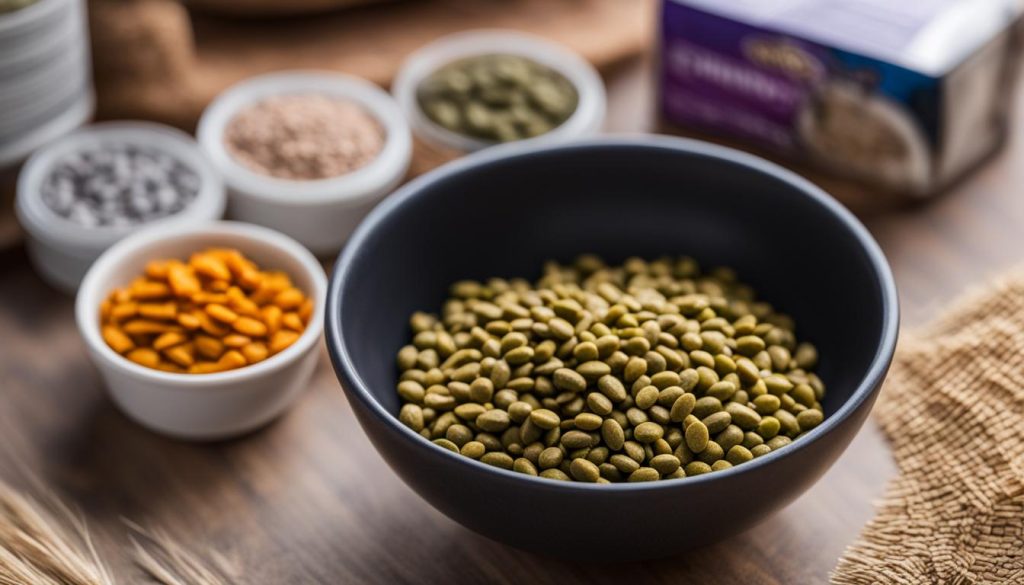Lyme disease is a prevalent tick-borne illness that affects both humans and dogs. Providing a proper diet is crucial to support a dog’s overall health and recovery from Lyme disease. In this article, I will explore dietary modifications and specific foods that can help alleviate symptoms and promote healing in dogs with Lyme disease.
Key Takeaways:
- Choosing the right diet for a dog with Lyme disease is essential for their overall health and recovery.
- Incorporating lean proteins, antioxidant-rich foods, omega-3 fatty acids, and probiotics can help alleviate symptoms and support the immune system.
- Consulting with a veterinarian or veterinary nutritionist is recommended to develop a personalized feeding plan for a dog with Lyme disease.
- Regular exercise and adhering to GMO-free and chemical-free feeding guidelines are important considerations for dogs with Lyme disease.
- BioStar offers targeted nutritional supplements specifically formulated for dogs with Lyme disease to provide additional support during treatment.
Understanding Lyme Disease in Dogs

Lyme disease in dogs is a tick-borne illness caused by the bacterium Borrelia burgdorferi. This bacterium is commonly transmitted through tick bites, making dogs vulnerable to infection when exposed to tick-infested environments. It is important for dog owners to be aware of the symptoms of Lyme disease in dogs and understand the transmission process.
The symptoms of Lyme disease in dogs can vary but often include recurrent arthritis or lameness, loss of appetite, depression, swollen joints, pain, fever, and fatigue. These symptoms may develop weeks or even months after a tick bite, making it crucial to seek prompt treatment if your dog displays any of these signs. Lyme disease can also lead to more serious complications if left untreated, such as kidney damage or neurological disorders.
Tick-borne diseases, including Lyme disease, are a significant concern for canines. Dogs can become infected during outdoor activities in areas where ticks are prevalent, such as wooded or grassy regions. Regularly checking your dog for ticks and implementing effective tick prevention measures can help reduce the risk of Lyme disease transmission and ensure your dog’s well-being.
Importance of a Balanced Diet for Dogs with Lyme Disease

A balanced diet plays a crucial role in supporting a dog’s immune system and overall health during Lyme disease treatment. Providing adequate nutrition can help reduce inflammation, support the immune system, and promote tissue repair. A diet rich in high-quality protein, antioxidants, omega-3 fatty acids, and probiotics can aid in alleviating symptoms and improving the dog’s response to treatment.
Protein is essential for supporting muscle repair and immune function. Lean meats such as chicken, turkey, or fish are great protein sources for dogs with Lyme disease. These meats are rich in amino acids that support healing and provide energy.
Antioxidants, found in foods like blueberries, spinach, sweet potatoes, and carrots, play a vital role in reducing inflammation caused by Lyme disease. Including these antioxidant-rich foods in the dog’s diet can help support the immune system and promote healing.
Omega-3 fatty acids are known for their anti-inflammatory properties and can help alleviate joint pain and inflammation associated with Lyme disease. Sources of omega-3 fatty acids include salmon, sardines, or flaxseed oil. Including these in the dog’s diet can aid in reducing discomfort and improving mobility.
Probiotics are beneficial bacteria that support a healthy gut microbiota. During Lyme disease treatment, the gut microbiota can become imbalanced. Including probiotics in the dog’s diet can help restore and maintain a healthy gut, improving digestion and overall immune function.
A balanced diet consisting of these essential nutrients can provide the necessary support for dogs with Lyme disease, aiding in symptom alleviation and promoting healing.
Table: Recommended Foods for Dogs with Lyme Disease
| Food Group | Recommended Foods |
|---|---|
| Protein | Chicken, turkey, fish |
| Antioxidants | Blueberries, spinach, sweet potatoes, carrots |
| Omega-3 Fatty Acids | Salmon, sardines, flaxseed oil |
| Probiotics | Probiotic supplements, yogurt, kefir |
By incorporating these recommended foods into a dog’s balanced diet, pet owners can provide important nutrients to support the dog’s immune system, reduce inflammation, and aid in overall healing during Lyme disease treatment.
Recommended Foods for Dogs with Lyme Disease
When it comes to feeding dogs with Lyme disease, it is important to provide them with nutritious foods that can support their overall health and aid in their recovery. Here are some recommended foods that can be included in the diet of dogs with Lyme disease:
Protein Sources:
Lean meats such as chicken, turkey, or fish are excellent sources of protein for dogs with Lyme disease. Protein is essential for muscle repair and maintenance and can help support the immune system.
Antioxidant-Rich Foods:
Incorporating antioxidant-rich foods into a dog’s diet can help reduce inflammation and support the dog’s immune system. Blueberries, spinach, sweet potatoes, and carrots are all great options to consider.
Omega-3 Fatty Acid Sources:
Omega-3 fatty acids have anti-inflammatory properties and can be beneficial for dogs with Lyme disease, especially when it comes to joint health. Including sources of omega-3 fatty acids such as salmon, sardines, or flaxseed oil can help alleviate joint pain and inflammation.
Probiotics:
During Lyme disease treatment, the dog’s gut microbiota may be disrupted. Including probiotics in their diet can help restore a healthy balance of gut bacteria and support digestion and overall gut health.
By incorporating these recommended foods into a dog’s diet, it can help support their immune system, reduce inflammation, and promote healing during Lyme disease treatment.
| Protein Sources | Antioxidant-Rich Foods | Omega-3 Fatty Acid Sources | Probiotics |
|---|---|---|---|
| Lean meats such as chicken, turkey, or fish | Blueberries, spinach, sweet potatoes, carrots | Salmon, sardines, flaxseed oil | Probiotic supplements or fermented foods |
| Help support muscle repair and the immune system | Reduce inflammation and support the immune system | Alleviate joint pain and inflammation | Restore a healthy balance of gut bacteria |
Potential Dietary Modifications for Dogs with Lyme Disease

When it comes to feeding dogs with Lyme disease, it may be beneficial to consider certain dietary modifications. These modifications can help support their overall health and aid in their recovery process. Here are some potential dietary modifications that can be considered:
1. Grain-Free Diet
Avoiding grains in the diet, such as wheat, corn, and soy, can be helpful for dogs with Lyme disease. A grain-free diet focuses on high-quality protein sources and alternative carbohydrate options to provide essential nutrients without potential allergens or inflammatory triggers.
2. Avoiding Processed Foods
Processed foods often contain artificial additives, preservatives, and low-quality ingredients that may worsen inflammation and negatively impact a dog’s overall health. Opting for fresh, whole foods and minimizing processed food intake can help support the dog’s immune system and aid in their recovery.
3. Allergen-Free Diet Suggestions
Identifying and avoiding potential allergens in a dog’s diet is essential, as allergies can exacerbate symptoms associated with Lyme disease. Common allergens for dogs include chicken, beef, dairy, and certain grains. Consultation with a veterinarian or veterinary nutritionist can help determine specific allergen-free diet suggestions for individual dogs.
While these dietary modifications may be beneficial for dogs with Lyme disease, it is important to consult with a veterinarian or veterinary nutritionist before making any significant changes to their diet. They can provide expert guidance and tailor dietary recommendations to the individual dog’s needs and condition.
Supporting Nutritional Supplements for Dogs with Lyme Disease
As part of the comprehensive treatment plan for dogs with Lyme disease, certain nutritional supplements can provide additional support to aid in their recovery and overall well-being. These supplements can help address specific needs that arise during the course of Lyme disease treatment. Here are some key supplements that can be beneficial:
Probiotic Supplements
Probiotics play a crucial role in promoting a healthy gut microbiota, which is often disrupted during Lyme disease treatment. Probiotics help restore the balance of beneficial bacteria in the digestive system, supporting proper digestion and nutrient absorption. Look for a high-quality probiotic supplement specifically formulated for dogs to ensure optimal efficacy.
Antioxidant Supplements
Antioxidants are essential for combating oxidative stress and reducing inflammation in the body. Dogs with Lyme disease can benefit from antioxidant supplements that help support the immune system, reduce inflammation, and promote overall healing. Look for supplements that contain antioxidants such as vitamins C and E, selenium, and beta-carotene.
Omega-3 Fatty Acid Supplementation
Omega-3 fatty acids are known for their anti-inflammatory properties and can be beneficial for dogs with Lyme disease, particularly in alleviating joint pain and inflammation. Fish oil supplements are a common source of omega-3 fatty acids for dogs. Ensure that the supplement is specifically formulated for dogs and contains appropriate levels of EPA and DHA.
Collagen Support for Canines
Collagen is a protein that plays a vital role in supporting connective tissues, such as joints, tendons, and ligaments. Supplementing with collagen can aid in tissue repair and promote overall joint health in dogs with Lyme disease. Look for collagen supplements specifically formulated for dogs, ensuring they contain bioactive collagen peptides.
| Supplement | Benefits |
|---|---|
| Probiotic Supplements | Restore healthy gut microbiota |
| Antioxidant Supplements | Reduce inflammation and support immune system |
| Omega-3 Fatty Acid Supplementation | Alleviate joint pain and inflammation |
| Collagen Support for Canines | Promote tissue repair and joint health |
Exercise and Lyme Disease in Dogs

Regular exercise is crucial for dogs with Lyme disease as it offers numerous benefits to their overall health and well-being. Exercise helps support the immune system, regulates the body’s inflammatory response, and promotes mental and emotional well-being. It is important to tailor exercise routines to the individual dog’s needs and capabilities, taking into consideration their energy levels and any physical limitations caused by Lyme disease.
Engaging in moderate exercise helps stimulate blood flow, which can aid in the recovery process and promote healing. It also helps maintain a healthy weight, preventing additional strain on the joints affected by Lyme disease. Exercise releases endorphins, which can improve the dog’s mood and reduce feelings of depression or anxiety that may arise during the treatment period.
However, it is essential to consult with a veterinarian to determine the appropriate exercise plan for a dog with Lyme disease. The veterinarian will consider the dog’s current health status, any joint pain or inflammation, and any limitations prescribed by the treatment plan. They may recommend low-impact activities such as swimming or gentle walks, avoiding high-impact activities that may exacerbate joint pain or fatigue.
The Importance of Exercise for Dogs with Lyme Disease:
- Supports the immune system
- Regulates the body’s inflammatory response
- Promotes mental and emotional well-being
- Stimulates blood flow and aids in the recovery process
- Helps maintain a healthy weight
- Improves the dog’s mood and reduces feelings of depression or anxiety
Regular exercise is not only beneficial for the physical health of dogs with Lyme disease but also plays a significant role in their mental and emotional well-being. It helps keep their spirits lifted and provides a sense of normalcy during the treatment period. Just like humans, dogs need exercise to stay healthy and happy, even when facing health challenges like Lyme disease.
| Recommended Exercise Tips for Dogs with Lyme Disease | Activities to Avoid |
|---|---|
|
|
Important Considerations for Feeding Dogs with Lyme Disease

Feeding dogs with Lyme disease requires careful consideration of their dietary needs and the impact of certain factors on their overall health. Here are some important considerations to keep in mind:
Dietary Considerations
When it comes to feeding dogs with Lyme disease, opting for a GMO-free diet can be beneficial. Genetically modified organisms (GMOs) have been associated with potential health risks, and dogs with compromised immune systems may be more susceptible to adverse effects. Choosing organic and non-GMO foods can help reduce the exposure to potentially harmful substances.
GMO-Free Diet for Dogs with Lyme Disease
Dogs with Lyme disease can benefit from a diet free from genetically modified organisms (GMOs). Opting for organic and non-GMO foods can help reduce the exposure to potentially harmful substances and support the overall health of the dog. A GMO-free diet may aid in reducing inflammation and promoting healing during the treatment of Lyme disease.
Chemical-Free Feeding Guidelines for Canines
Another important consideration is to follow chemical-free feeding guidelines for dogs with Lyme disease. Minimizing the exposure to herbicides, particularly glyphosate, is recommended for dogs with compromised immune systems. Choosing natural and chemical-free food options can help support the dog’s overall well-being and facilitate the recovery process.
By taking these dietary considerations into account, you can provide your dog with Lyme disease the best possible nutrition to support their immune system and overall health during their treatment.
Recommended BioStar Supplements for Dogs with Lyme Disease

When it comes to supporting dogs with Lyme disease, BioStar offers a range of supplements specially formulated to provide targeted nutritional support during treatment. These supplements can help alleviate symptoms and promote the healing process. Incorporating BioStar supplements into a dog’s feeding plan can be beneficial in supporting their overall well-being and immune system.
Probiotic Supplements
Probiotics are essential for maintaining a healthy gut microbiota, especially during Lyme disease treatment. BioStar’s probiotic supplements are designed to restore and maintain the balance of beneficial bacteria in the gut, supporting digestion, nutrient absorption, and immune function. By promoting a healthy gut, these supplements can contribute to the dog’s overall health and resilience.
Antioxidant Supplements
Antioxidants play a crucial role in reducing inflammation and supporting the immune system. BioStar’s antioxidant supplements are rich in natural compounds, such as vitamins C and E, and other plant-based antioxidants. These supplements help neutralize harmful free radicals, protecting the dog’s cells from oxidative damage and promoting a healthy inflammatory response.
Canine Immune Support Supplements
During Lyme disease treatment, supporting the immune system is vital for the dog’s recovery. BioStar offers immune support supplements that are formulated with a blend of herbs, mushrooms, and other natural ingredients known for their immune-boosting properties. These supplements can help strengthen the dog’s immune response and enhance their ability to fight off infections and support overall health.
| Supplement | Key Benefits |
|---|---|
| Probiotic Supplements | Restore and maintain a healthy gut microbiota, support digestion and nutrient absorption, enhance immune function |
| Antioxidant Supplements | Reduce inflammation, protect cells from oxidative damage, support a healthy inflammatory response |
| Canine Immune Support Supplements | Boost the immune system, enhance the body’s ability to fight off infections, support overall health |
Disclaimer: It’s important to consult with a veterinarian before adding any supplements to a dog’s diet, as individual needs may vary.
When it comes to providing the right nutritional support for dogs with Lyme disease, BioStar supplements can be a valuable addition to their feeding plan. These supplements, including probiotics, antioxidants, and immune support formulas, are specifically formulated to help alleviate symptoms and promote the dog’s overall well-being. Consult with a veterinarian to determine the appropriate supplementation and feeding plan for your dog’s specific needs.
Wrapping Up
In conclusion, providing a proper diet is crucial for dogs with Lyme disease as it supports their overall health and aids in their recovery. A balanced diet that includes lean proteins, antioxidant-rich foods, omega-3 fatty acids, and probiotics can help alleviate symptoms and promote healing. Additionally, making dietary modifications such as adopting a grain-free or allergen-free diet may be beneficial for some dogs.
It is important to consult with a veterinarian or veterinary nutritionist to develop a personalized feeding plan for your dog with Lyme disease. They can help determine the best dietary approach and recommend specific foods and supplements to support your dog’s immune system and reduce inflammation. Regular exercise is also important as it supports the immune system and improves overall well-being.
Lastly, it is crucial to consider certain dietary guidelines, such as avoiding GMOs and reducing exposure to herbicides, to protect your dog’s immune system. Careful selection of dog treats is also important as many contain added sugars or undesirable ingredients. By taking these factors into account, you can provide your dog with the best possible nutrition and support during their Lyme disease treatment.
FAQ
What should I feed my dog with Lyme disease?
It is important to provide your dog with a balanced diet that includes lean meats, antioxidant-rich foods, omega-3 fatty acids, and probiotics. These can help reduce inflammation, support the immune system, and promote tissue repair.
What are the symptoms of Lyme disease in dogs?
Symptoms of Lyme disease in dogs may include recurrent arthritis or lameness, loss of appetite, depression, swollen joints, pain, fever, and fatigue.
Should I modify my dog’s diet if they have Lyme disease?
Some dogs may benefit from dietary modifications, such as a grain-free diet or avoiding processed foods. It is important to consult with a veterinarian or veterinary nutritionist to determine the best approach for your dog.
What are some recommended foods for dogs with Lyme disease?
Foods such as lean meats (chicken, turkey, fish), blueberries, spinach, sweet potatoes, carrots, salmon, sardines, and flaxseed oil can be beneficial for dogs with Lyme disease.
Are there any supplements that can support dogs with Lyme disease?
Yes, probiotic supplements can help restore gut health, antioxidant supplements can reduce inflammation, omega-3 fatty acid supplements can support joint health, and collagen support supplements can aid tissue repair. Always consult with a veterinarian before adding any supplements to your dog’s diet.
How important is exercise for dogs with Lyme disease?
Regular exercise is essential for dogs with Lyme disease as it supports the immune system, helps regulate the body’s inflammatory response, and improves mental and emotional well-being.
Are there any dietary considerations for dogs with Lyme disease?
It is recommended to provide a GMO-free diet and reduce exposure to herbicides, particularly glyphosate, for dogs with compromised immune systems. Careful selection of dog treats is also important to avoid added sugars or undesirable ingredients.
What supplements does BioStar recommend for dogs with Lyme disease?
BioStar offers a range of supplements specifically formulated to support dogs with Lyme disease, including probiotic supplements for gut health, antioxidant supplements to reduce inflammation, omega-3 fatty acid supplements for joint support, and collagen support supplements for tissue repair.
Can I feed my dog raw food in addition to commercial kibble?
Adding raw food to commercial kibble can provide additional enzymes and nutrients for dogs. However, it is important to consult with a veterinarian to ensure a balanced diet and prevent any potential health risks.
What is the best diet for dogs with Lyme disease?
There is no one-size-fits-all approach to feeding dogs with Lyme disease. It is recommended to consult with a veterinarian or veterinary nutritionist to develop a personalized feeding plan based on your dog’s individual needs and condition.






